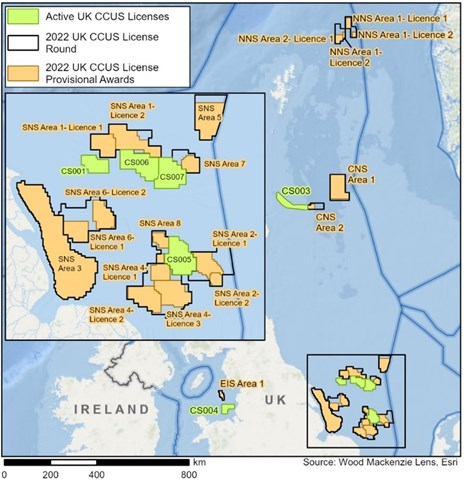Discuss your challenges with our solutions experts
The UK’s first carbon storage bid round: how much capacity will it deliver?
Plus more views from around the world of CCUS, including CNOOC commissioning China’s first offshore project and ExxonMobil’s carbon offtake agreement with a Louisiana steel producer
3 minute read
Stephanie Chiang
Senior Research Analyst, CCUS

Stephanie Chiang
Senior Research Analyst, CCUS
Stephanie provides insight and analysis on CCUS to project developers, technology providers, investors and governments.
Latest articles by Stephanie
-
The Edge
A world first: shipping carbon exports for storage
-
Opinion
A two-decade decline in exploration is driving the need for carbon neutral investment in Australia’s upstream sector
-
Opinion
The UK’s first carbon storage bid round: how much capacity will it deliver?
Annick Adjei
Senior Research Analyst, Subsurface (New Energies)

Annick Adjei
Senior Research Analyst, Subsurface (New Energies)
Annick is instrumental in advancing Wood Mackenzie’s geothermal solution.
Latest articles by Annick
-
Opinion
Rock solid: geothermal’s upward trajectory
-
Opinion
Geothermal: the next North American goldrush?
-
The Edge
The coming geothermal age
-
Opinion
Heating up: 2024 showcased the promise of geothermal energy
-
Featured
Subsurface 2025 outlook
-
Opinion
Wells to watch 2025
The UK has announced 20 provisional licences in its first carbon storage bid round. Which blocks have been awarded so far and to whom? How much CO2 can they potentially store?
We explored this developing story, and more, in our latest CCUS in brief report. Visit the store to read it in full, and read on for three highlights from Q2.
1. UK offers 20 provisional licences following its first carbon storage bid round
On 18 May, the North Sea Transition Authority (NSTA) announced the results of the UK’s first carbon storage licensing round. Very few details of the awards were disclosed. However, it does provide a geographic view of the provisional licence offers.
The 13 original offering blocks were subdivided into 20 provisional licences, granted to 12 different companies. The awards cover more than 12,000 km2, underpinning hopes that this will enable up to 30 million tonnes per annum (Mtpa) of CO2 injection capacity within the next decade.
Only two of the awardees have confirmed their exact blocks at this time.
- EnQuest has secured NNS-1 and NNS-2. Located northeast of Shetland, we estimate these depleted fields to have a best estimate storage capacity of around 76 million tonnes (Mt) of CO2.
- In the East Irish Sea, Spirit Energy has been awarded a carbon storage licence that covers the Morecambe North and Morecambe South fields. We estimate the combined storage capacity is around 705 Mt of CO2.
Globally, these awards are substantial, both in number of licences offered and the potential storage projects that they enable. Although the UK’s 30 Mtpa target does not seem unreasonable, it would still represent around 50% of the total global operating capacity today and around 10% of the required global capacity in 2030 under our 2.5 °C base case scenario.
That same 30 Mtpa injection target would suggest a requirement of at least 900 MT of licensed storage capacity to support a 30-year project life at full rates. These awards appear to have sufficient volumetric storage capacity to support that ambitious target.
CNOOC commissions China's first offshore CCS demonstration project
China’s first offshore CCS project is part of the Enping 15-1 oilfield development, located in the South China Sea’s Pearl River Mouth Basin. CO2 emissions will be captured from the oil production process and reinjected into the saline water layer at a depth of 800 metres. It’s expected to store more than 1.5 Mt of CO2 over the lifespan of the field. The demonstration project comes just six months after first oil, and the field is expected to produce out into the 2040s.
While this is a small-scale demonstration, it is a step towards CNOOC’s larger goal of establishing a CCUS hub in Guangdong. The national oil company (NOC) has also set its sights on building three CCS industry clusters beyond Guangdong, centring on its production hubs in Bohai Bay, the Yangtze River Delta region and the Hainan province.
CNOOC is not the only NOC that’s stepping up CCUS plans in China – Sinopec, PetroChina and CNPC have their own developments in progress. CCUS is gaining momentum in China, underscoring the importance of the technology in reaching its carbon neutrality target.
ExxonMobil signs a carbon offtake agreement with a steel producer in Louisiana
ExxonMobil has signed a carbon capture and storage agreement with Louisiana steel producer Nucor corp. Exxon will capture, transport and store 0.8 Mtpa of CO2 from Nucor’s direct reduced iron (DRI) plant.
This agreement directly aims at decarbonising hard-to-abate industries. And it exemplifies the level of collaboration required between the upstream and industrial sectors to accelerate the path to net zero.
Similar partnerships between storage operators and emitters are strongly needed to reduce the gap between capture and storage capacity in the US and Canada. However, storage permit applications for class VI wells remain a hurdle in the US.
To date, only Wyoming and North Dakota can issue storage permits to CCS project operators. Due to significant delays with the EPA’s federal process, several states including Texas and Louisiana have applied for primacy. Louisiana’s application should be approved in the coming months, strengthening the momentum of the CCS industry.
Want to track the ever-changing world of CCUS? Here’s how:
- Visit the store to read this report in full.
- Browse our latest CCUS articles
- Find out how Lens CCUS can help you tap into critical insights to shape your CCUS strategy.

Energy & Natural Resources Summit: EMEA
Investing for success in a low-carbon future | 21 September, in London
Register now







